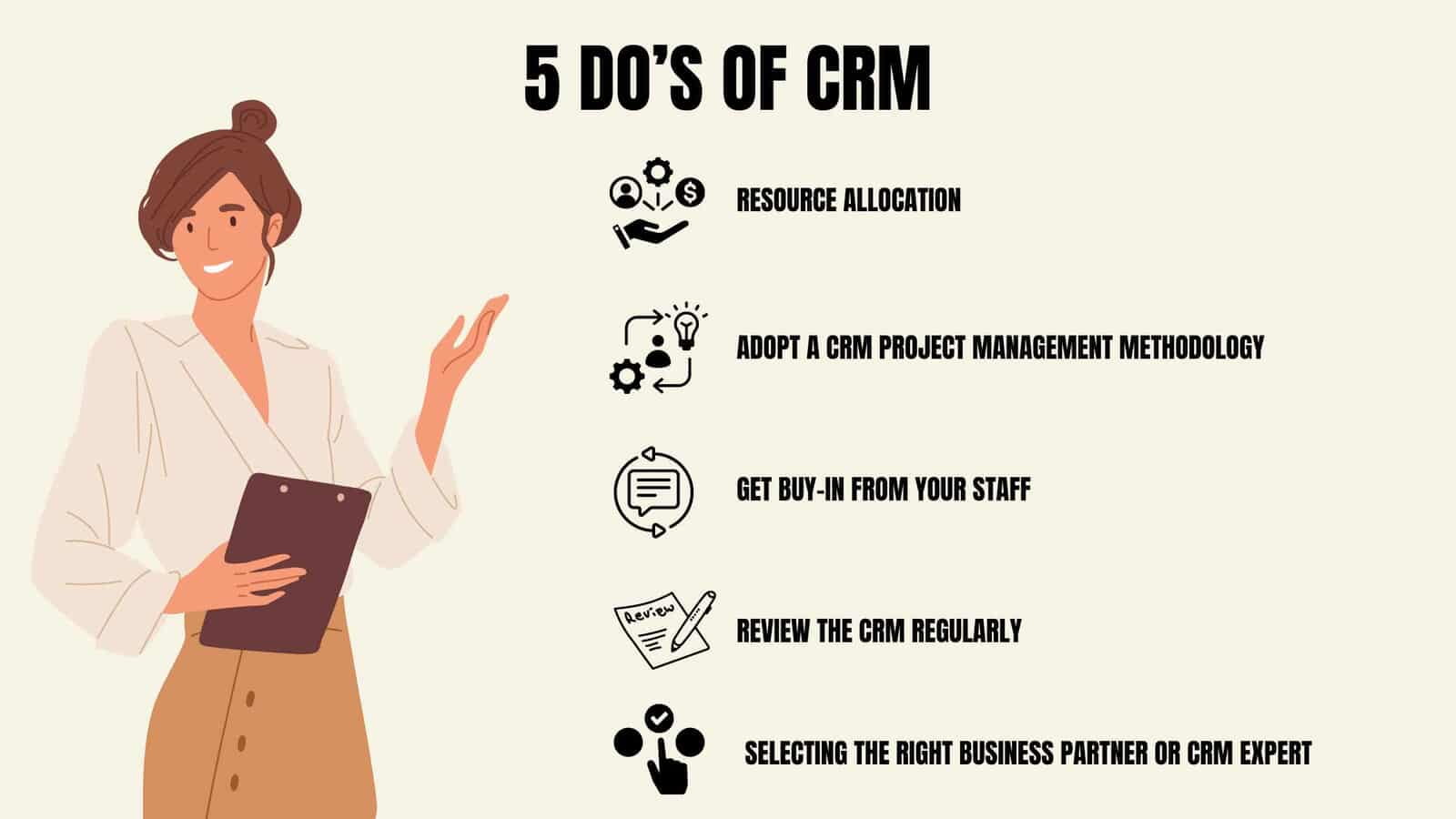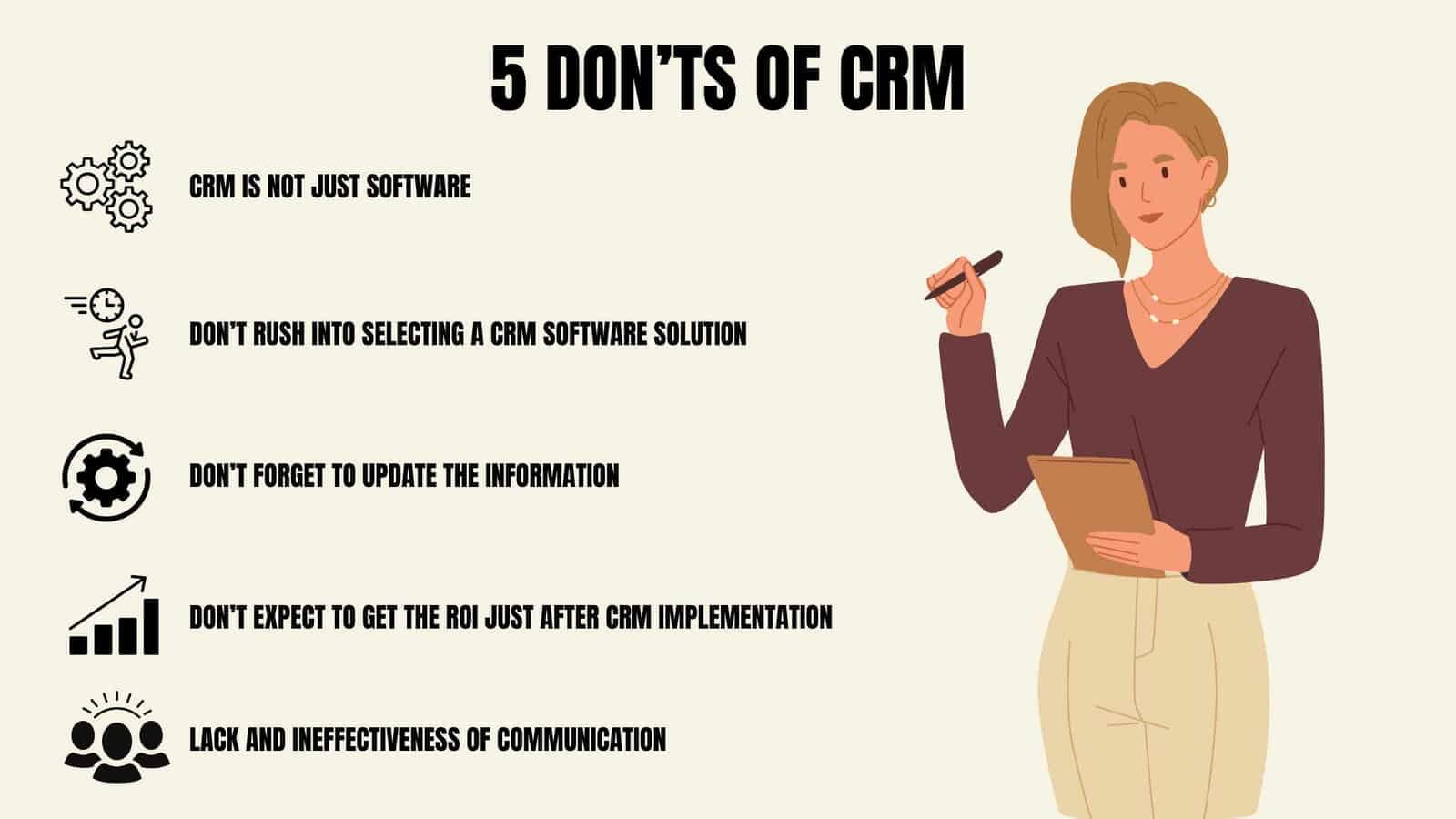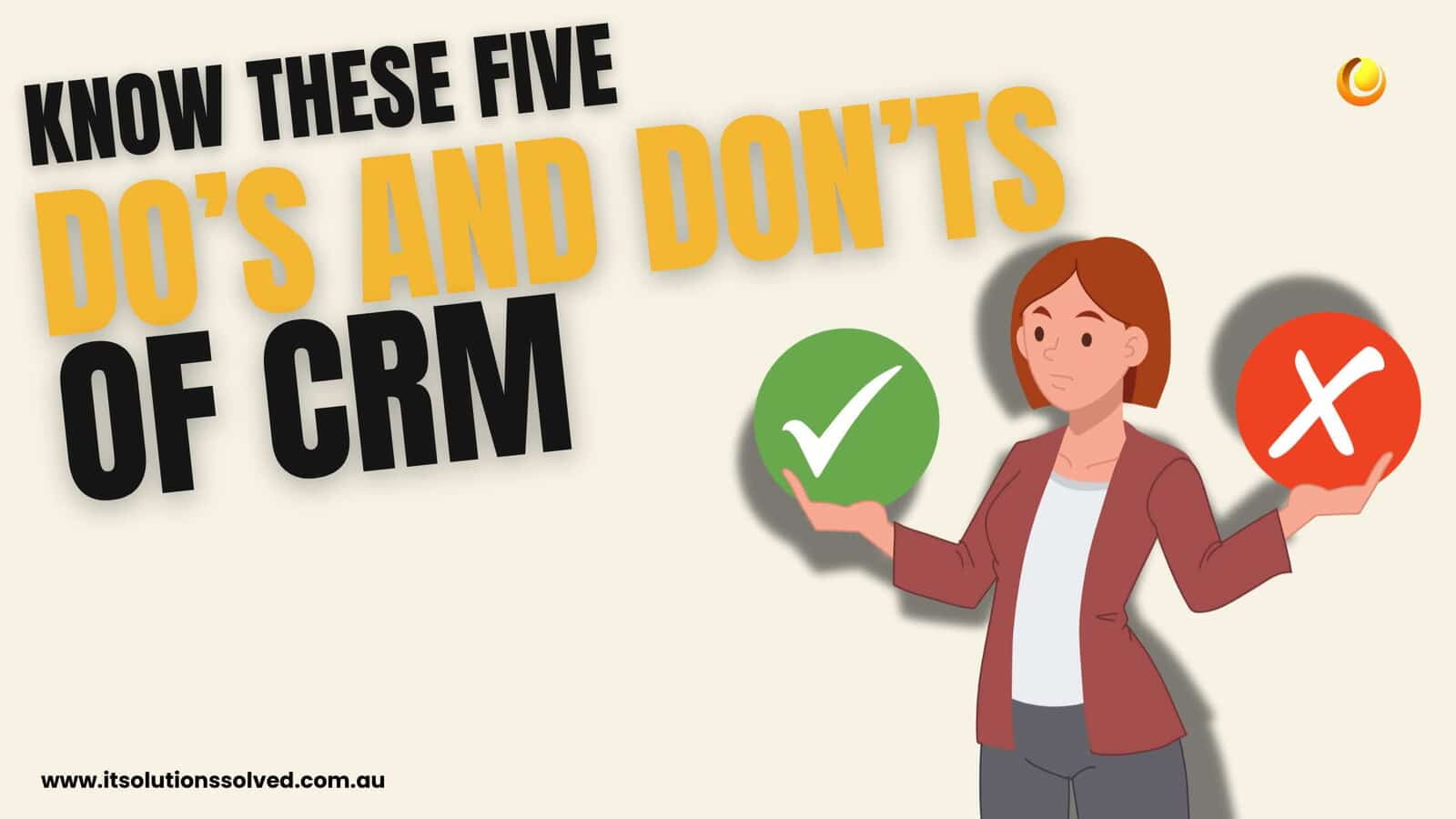Introduction to do's and don'ts of CRM
There are lot of tutorials and videos regarding CRM but it's not that easy to implement a succesful CRM. It take time and expertise to implement a CRM. Having a CRM allows you to centralise your customer data that can be access by your team, The holistic view of every customer will help you in personalised interactions and customised services. CRM can also enable effective and targeted marketing campaigns that make your business will reach to the right person. A good CRM can enhance customer loyality and retention by analysing the data. Before any kind of software implementation you have to do some homeworks about what should you do and what you shouldn't before implement that software. We will discuss some Dos and Don'ts that will definitely help you if you are considering CRM. Lets move to our post about do's and don'ts of CRM.

What should you do when implementing CRM?
Resource Allocation: You should know how to allocate your internal resources to dedicate some time to the CRM project or make sure to select a consultant who can understand your requirements. If your business is handling multiple projects, then you should ensure that every project receives all the important information and expertise in your organisation. Managing your resources efficiently and using expertise both internally and externally will help you in better CRM implementation. This process also ensures that your implemented CRM is well aligned with all the specific needs and optimised for your business success.
Adopt a CRM project management methodology: You need to make sure that project management should be seamless from beginning to end. There are numerous methodologies such as Agile, Kanban and Waterfall, these all will help you in reducing risks and better ROI. These approaches focus on smooth and continuous processes throughout your project lifecycle and also help to ensure that the implementation of CRM is well-coordinated. Just by a good methodology, you can streamline workflows, improve collaboration and optimise the utilisation of your implemented CRM. Many platforms have their implementation methods i.e. custom processes, templates and formulas. The main concept is to have a single and repeatable process that will work in as many situations as possible. it is one of the common mistakes you should avoid, that's why we put it in our list of do's and don'ts of CRM.
Get buy-in from your staff: It is another important thing for successful CRM implementation. Basically, you have to make sure that your employees or staff understand the benefits of implementing CRM, they should know how to use it efficiently. By clear communication, their daily work, productivity and efficiency can be improved. CRM will reduce their time to manual tasks, provide them with better and centralised access to customer information and help them in effective sales and marketing work. You should provide them with training to ensure that they are comfortable using the CRM and learn how to use its full capabilities. Provide them user guide or one-on-one coaching. You can also implement a recognition program to acknowledge and reward your staff who efficiently use CRM. You can gain the essential buy-in from staff, leading to a more successful CRM implementation.
Review the CRM regularly: Your business changes so will your CRM. Continuously assessing your CRM will help you to make sure that it evolves with your business needs. This process is very necessary for CRM effectiveness and relevance with time. You can find areas for improvement and quickly adapt to changing your business requirements. You can leverage the CRM to its full potential with this approach. It will also leverage you in the market as well.
Selecting the right Business Partner or CRM Expert: Selecting a partner for CRM implementation is a crucial are time-consuming process. Some of them are very costly and some are not good enough for your business requirements. So, you can make sure that your partner has expertise in multiple CRM software and implement it quickly under your budget. There are a lot of CRM options in the market such as Zoho, Salesforce and Hubspot. CRM platform must be aligned with your requirements. You should prioritise your partner on its previous client and how quickly they implement CRM with minimal disruption. Now, move to our next part in do's and don'ts of CRM.

What should you avoid when implementing CRM?
CRM is not just software: CRM is not just software, it's more a strategy that changes the way your business will work. Don’t take it as installing software in your system. It encompasses modification in your employees, processes and procedures in your business. CRM’s main purpose is managing customer relationships and all useful relevant data. CRM help you in sales and analytics but it also helps in business strategy. You will know the performance of your team and the utilisation of your resources. CRM is a customer intelligence tool.
Don’t rush into selecting a CRM software solution: You should identify your specific business requirements and needs that you want your CRM to address. Begin your selection by identifying your obstacle and finding out why your current solutions aren’t working for you anymore. Every business is different so their requirement is. Analyse your existing infrastructure and complexities in operations. You can appoint a professional to your team or you can partner with CRM experts. Thinks about do's and don'ts of CRM, don't make decisions in a hurry.
Don’t forget to update the information: Updating all the important processes, procedures and documentation is vital when you going to change your software infrastructures. It will help in maintaining accuracy and relevancy and also make sure that the transition and preventing confusion among users will be smooth. The documentation should cover how, why and when to use the CRM system. This will help and save time for the people who are new to CRM. The guide should come with visuals such as screenshots, videos and examples with updated information. Your business can maintain a cohesive and better CRM with updated information.
Don’t expect to get the ROI just after CRM implementation: Calculating an ROI can be a little bit tricky, as it depends on multiple factors such as who implements it and who and how to use it. CRM is not a magic button and it doesn’t guarantee any overnight success. It will take proper time and skill to reap its complete benefit and sometimes you need experts to do that. In 2011, Nucleus Research found that the average Return on Investment of CRM was around $8.70 which is almost 8.7x return on your investment. So, if you know the game you can win.
Lack and ineffectiveness of Communication: Poor communication is a major cause of failure of CRM implementation which will lead to resistance to change and project failure. Communication plays an important role in the successful adoption and use of CRM by stakeholders in your business. It involves all levels of your business from managers to workers. Convey your goals, objectives, requirements, needs, benefits and progress to avoid all possible disruptions and mistakes. You can address your concerns or gather feedback from your team to make sure that CRM is well implemented. Continuous communication can help you a lot. But sometimes, poor communication can occur from your implementation partner as well. So make sure you select the right person to implement your CRM. Remember these do's and don'ts of CRM, it will benefit you.
Conclusion
Poor implementation of CRM can cause a headache for business or startup owners like you. This happens when a professional team doesn’t work on the implementation and testing process. To save some money, many businesses bear losses for silly mistakes. CRM should be implemented by professionals. Either you learn how to implement it or hire someone who knows about both the CRM and the market. These do's and don'ts of CRM can help you in your digital transformation journey. I hope you like our post. Thanks for your valuable time. IT Solutions Solved is an experienced CRM consultation and implementation firm. If you need any kind of assistance and help you in implementing CRM. Just Connect with us by clicking the button below.






